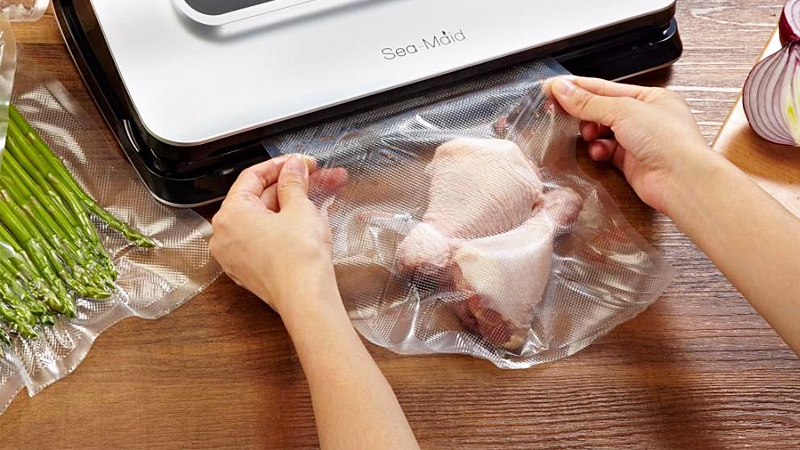
In today’s fast-paced world, it’s not uncommon for people to do their grocery shopping once a week and stock up on all the necessary food and household items for the entire month. Fresh produce, in particular, is often prioritized by homemakers, who believe that “as long as it’s frozen, it can last forever.”
However, this belief is not entirely accurate. Different types of food have different shelf lives, and while freezing can extend the lifespan of perishable items, it doesn’t make them last indefinitely.
1. Meat Storage Times
| Type of Meat | Refrigerator Shelf Life | Freezer Storage Time |
| 3 – 5 days | 4 – 12 months | |
| 3 – 5 days | 4 – 12 months | |
| Beef, Grilled Pork | 3 – 5 days | 4 – 12 months |
| Bacon | 1 week | 1 month |
| Ground Meats | 1 – 2 days | 3 – 4 months |
| 1 week | 1 – 2 months | |
| 1 week | 1 – 2 months | |
| Whole Chicken | 1 – 2 days | 12 months |
| Cut-up Chicken | 1 – 2 days | 9 months |
| Chicken Giblets, Heart, Liver, etc. | 1 – 2 days | 3 – 4 months |
2. Seafood Storage Times
| Type of Seafood | Refrigerator Shelf Life | Freezer Storage Time |
| Live Prawns | 1 – 2 days | 2 – 3 months |
| Cooked Fish | 3 – 4 days | 4 – 12 months |
| Deboned Fish | 1 – 2 days | 2 – 3 months |
| Smoked Fish | 10 days | 3 months |
| Shrimp | 1 – 2 days | 3 – 6 months |
| Lobster | 1 day | 12 months |
| Clams, Mussels, Scallops, etc. | 1 – 2 days | 2 – 3 months |
| Squid | 2 days | 3 – 6 months |
| Crab | 2 – 3 days | 10 months |
| Oysters | 5 days | 2 – 3 months |
3. Fruit and Vegetable Storage Times
| Type of Produce | Refrigerator Shelf Life | Freezer Storage Time |
| Leafy Greens | 3 – 5 days | 8 – 12 months |
| Broccoli, Cauliflower | 2 – 3 days | 8 – 12 months |
| Mushrooms | 3 days (store in paper bags) | 6 – 12 months |
| Asparagus, Green Beans | 1 week | 9 – 12 months |
| Do not store in refrigerator | 1 – 2 months | |
| Eggplant, Peppers | 2 weeks | 8 – 12 months |
| 3 weeks | 8 – 12 months | |
| Do not store in refrigerator | 6 months | |
| Do not store in refrigerator | 6 months | |
| Do not store in refrigerator or freezer | Do not store in freezer | |
| Winter Squash | Do not store in refrigerator | Do not store in freezer |
| Avocado | 3 days | Do not store in freezer |
| Berries, Cherries | 4 – 5 days | Do not store in freezer |
| Mango | 4 days | Do not store in freezer |
| Papaya, Pineapple | 1 week | Do not store in freezer |
| Grapes | 1 – 2 weeks | Do not store in freezer |
| Citrus Fruits (Oranges, Lemons, etc.) | 1 week | 3 months |
4. Beverage Storage Times
| Type of Beverage | Refrigerator Shelf Life | Freezer Storage Time |
| 9 – 12 months | Do not store in freezer | |
| 9 – 12 months | Do not store in freezer | |
| 1 day | 1 week | |
| 1 week | 12 months | |
| Homemade Fruit Juice | 1 day | 6 months |
| 1 – 2 days | 3 – 6 months | |
| 1 – 2 days | 1 – 2 months |
5. Other Food Storage Times
| Type of Food | Refrigerator Shelf Life | Freezer Storage Time |
| 3 – 5 days | 1 – 2 months | |
| Cooked Rice | 1 – 2 days | 3 months |
| 3 – 5 days | 6 – 9 months | |
| Cooked Noodles | 1 – 2 days | 3 months |
| Yogurt | 1 – 2 days | 1 – 2 months |
| 1 day | 2 – 3 months | |
| 1 week | 6 – 8 months | |
| Nuts (Cashews, Almonds, etc.) | 1 week | Do not store in freezer |
| Raw Eggs | 3 – 5 weeks | Do not store in freezer |
| Hard-boiled Eggs | 1 week | Do not store in freezer |
Notes:
– It is not necessary to wash fruits and vegetables before storing them in the refrigerator as this increases moisture, leading to faster discoloration and nutrient loss. Instead, only trim off old parts and peel away any damaged areas. Then, sort and store them in the refrigerator.
– When freezing meat, it is best to divide it into portions to avoid defrosting a large amount at once, which can affect the flavor and nutritional value.
– To optimally freeze food, use vacuum-sealed bags and maintain a freezer temperature of -18°C.

For further reference: Always Fresh and Safe
We hope this article helped clarify the . If you have any questions or concerns, please leave a comment below, and we’ll get back to you shortly!


































